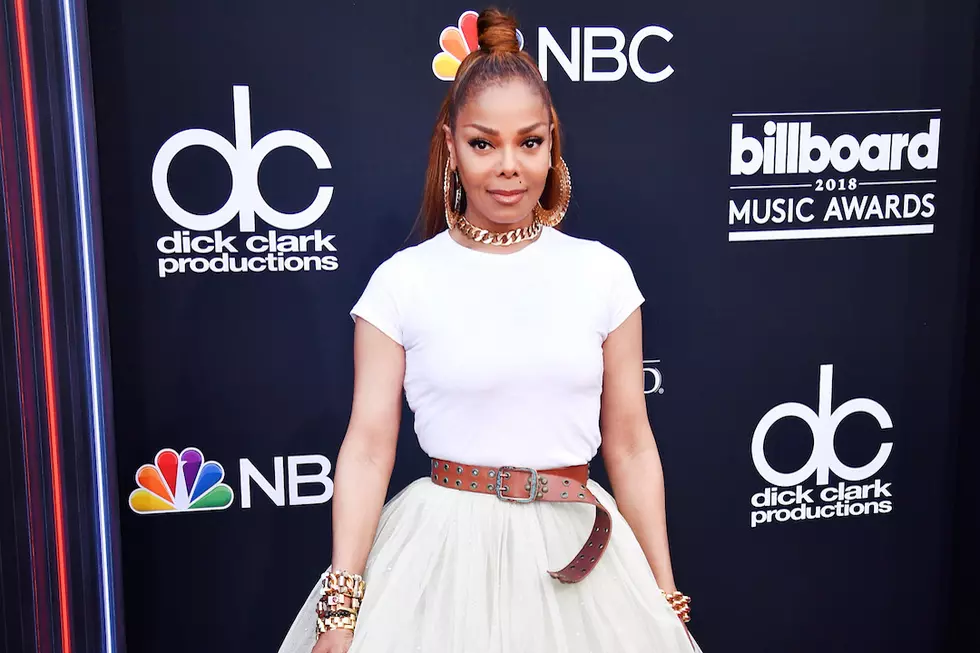
How Janet Jackson’s ‘Control’ Changed My Life
It’s Janet June! All month long, we’re paying tribute to Janet — Miss Jackson, if you’re nasty — with a celebration the legacy of the icon as she prepares to make her long-awaited comeback to the music scene. Welcome back, Miss Janet.
I was seven years old when Control, Janet Jackson’s third studio album, was released in 1986. A half-Irish, half-Puerto Rican only child of two ex-Manhattanites trying to navigate the suburbs, I was a chubby ginger who spent tons of time alone and loved to dance. Oh lord, I loved to dance. I was not very good.
My Saturday mornings belonged to Soul Train in the mid '80s. If my parents were blessedly busy with chores outside of the living room, I could get off the couch and really cut loose: Swinging my hips as my round face grew ruddy with exertion, I’d writhe around trying to keep up with the dancers onscreen who were undulating into the camera. For some reason, I did this standing less than two feet away from the TV set. Was I ready to turn the dial to cartoons at a moment’s notice, afraid to be caught in the boogie zone? I don’t remember. What I do remember is seeing Janet Jackson interviewed by Don Cornelius and realizing she was the coolest person alive.
Everything about her fascinated me: Her soft-spoken composure as Cornelius towered over her and the men in the front row whooped and laughed, the mullet-glam shape of her curly hairstyle, how good her gold flare looked against her buttoned-up shirt and black blazer. I stood hypnotized, inches from the screen now, as she described writing, producing and playing keyboards on her album: “I’ve been playing for a pretty long time, but no one really knew about it.” I knew who Janet was, and that she was Michael’s sister, though I knew nothing of her family’s complicated dynamics at the time. She performed “Control” that day and, completely taken with her dancing and the drum machines, I asked my mom to take me down to Sam Goody and buy me the album of the same name. It changed my life.
As an adult (and an unabashedly feminist writer), I’ve spent a lot of time thinking about the self esteem-related pitfalls that visit many young women in their tween years and beyond. When American girls turn the corner into adolescence, they’re virtually blindsided by a barrage of negative, conflicting messages from media and society about their bodies and self worth — a disruption that gender-studies psychologist Carol Gilligan calls “hitting the wall.” DoSomething.org reports that roughly 91% of women are unhappy with their bodies, and that “students, especially women, who consume more mainstream media, place a greater importance on sexiness and overall appearance than those who do not consume as much.”
I’ve wondered how I was able to sidestep “the wall” back then, despite watching it happen to fellow students and friends all around me. I feel lucky to count myself among this professed 9% of women who haven’t suffered from body image-related issues, and despite attending five grades at five different schools while looking like a straight-up dork, I remained weirdly confident throughout. As with any nature-versus-nurture debate, this could be a mix of sheer luck, neurochemistry and my mother rarely pressuring me to be either “pretty” or “nice” growing up. But I truly believe — and have said several times over the years — that Control crossed my path at a pivotal time, and its lyrics transmitted positive messages that helped to form a Kevlar-like layer of self worth over my impressionable young self.
Control is full of empowerment jams, mainly crafted by Janet and songwriters/producers/all-around music geniuses Jimmy Jam and Terry Lewis. The opening theatrics in the above music video are barely fictional; this album was the first Janet made after breaking free from her father Joe Jackson's controlling management. I've sang along with the breakdown so many times it's encoded in my DNA, and I'll probably hear the lyrics in my head as I fall to my death after one of my enemies shoves me off a cliff: "Got my own mind / I wanna make my own decisions / When it has to do with my life, my life / I wanna be the one in control."
I danced around my bedroom to "Nasty," singing "I'm not a prude / I just want some respect" and learning about a certain type of dude long before the terms "scrub" and "f---ckboy" were invented. I internalized the "What Have You Done For Me Lately" lyrics, quoting them decades later in defense of my low tolerance for relationship nonsense. "You Can Be Mine" and "When I Think Of You" encouraged me to be proactive in pursuing a worthy love, while "The Pleasure Principle" reminded me to keep it moving if a boy ever drained my resources: "Hey, take a ride in a big yellow taxi / I'm not here to feed your insecurities /I wanted you to love me."
"Let's Wait Awhile" endorsed the value in taking it slow, and "Funny How Time Flies" marked the first time I was ever fascinated by a song's production before I even knew what "production" was, much less that I'd someday be writing about it for a living (Tinashe can co-sign the song's excellence). "He Doesn't Even Know That I'm Alive" sailed right over my head, though it's worth noting that it's one of only two Control tracks Jackson didn't co-write.
Jackson, along with Jimmy Jam and Terry Lewis, went on to repeatedly switch up her sound on subsequent albums, and I followed her career as I grew up. She shed her boxy black blazer to go topless on the cover of Rolling Stone in 1993. And in 2004, of course, she endured an avalanche of fallout from the infamous “Nipplegate” incident at Super BowlXVIII (let us never forget that she took full blame, with her halftime show co-star Justin Timberlake all but throwing her under the bus).
Years after Control helped shape my pre-adolescent brain, I would learn that Janet herself struggled with a lack of confidence and low self-worth related to her weight. She told Meredith Viera in 2011, “I would literally bang my head up against the wall because I didn't feel attractive. ... There was a lot of pain in my life. But I did. I felt very unattractive.” For me, it was a powerful lesson in the fluidity between an artist, their intent, and their evolving body of work.
Even the way she publicly explores her relationship to her own body and her sexuality feels brave and instructive to me — even in her (perceived) missteps. In my mid-thirties I’m long past any need for a role model, but Janet remains my hero.
More From Lite 98.7










